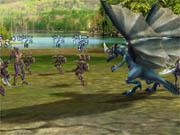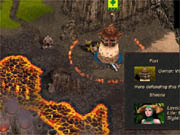Etherlords is a strange concoction, shamelessly cribbing from Heroes of Might & Magic for its grand strategy and Magic: The Gathering for its tactical combat. It's one of those ideas that's crazy enough it just might work. And sure enough, it does, for the most part. Although the grand strategy is a bit misguided, the tactical combat is a splendid twist on the concept of collectible card games.

If you've never played collectible card games (CCGs), you're probably several hundred dollars richer than those who have. The idea is that you build a deck suited to a particular strategy and use it to duel against other players. You play cards to build up a powerful force and to trump what your opponent might do. You know which cards are in your deck and how they work together. But which card will you draw next? Which cards does your opponent have? It's a combination of strategy and mystery, planning and randomness, order and chaos. Games can be exciting, and deck building can be an enjoyable hobby. Before you know it, you've laid out a nice chunk of change in pursuit of those rare powerful cards to round out your collection and improve your chances of winning. Although Etherlords misses completely the collecting aspect, it nails the dynamics of actually playing CCGs.
The mechanics of Etherlords as a CCG are almost identical to those of Magic: The Gathering. Magic players will immediately recognize concepts like mana, tapping, blocking, summoning sickness, walls, flying, trampling, first strike, regeneration, and so forth. Instead of tapping lands as in Magic, mana management (or "ether," in this case) is automatic and based on a hero character's experience level. There are a few significant twists that seem geared to prevent long standoffs. Damage between attackers and blockers isn't simultaneous, so blocking creatures won't hit back unless they survive. This means powerful attackers are much less vulnerable, and the end game is more often a bloodbath than an impasse. After ten turns, wizards start taking damage at the beginning of every turn. Waiting your opponent out and making sure you have more health will win a lot of duels.
Since many CCGs let you play cards during your opponent's turn, there are all sorts of tricky timing issues and rule exceptions. Etherlords sidesteps these by breaking combat into discrete phases; you can never act during your opponent's phase. This streamlines the action, and it means there are fewer nasty surprise trumps ("Ha! I'm casting twiddle to untap my mountain, then I'm tapping it for one red mana and buffing my shivan dragon just enough to block and kill your serra angel with holy armor!").
However, the gameplay is fleshed out a bit more because each hero has a specialization that gives him or her a constant bonus effect. Some specializations work only with a specific card, some work only with specific types of creatures, and some tweak the basic rules. For instance, life web means that the hero can get double health from a healing spell called spiritual web. Kobold's cunning means that the hero's kobolds have a chance to inflict double damage. Dexterous hands means that the hero might get to draw an extra card every round. There are also skills that can be learned and improved over the course of a scenario and artifacts with limited charges that can cast powerful spells at any time in a duel. Unlike a CCG, there's more to Etherlords than the cards themselves.

Also unlike in a CCG, the graphics are spectacular. Tabletop CCGs use snippets of artwork to illustrate the proceedings. There have been several computer games based on CCG dynamics, but they've taken their card motif literally. In MicroProse's computer version of Magic: The Gathering and Genetic Anomalies' Chron-X, you're actually playing with little pictures of cards. Digital Addiction's Sanctum and Activision's Star Trek: ConQuest Online went a step further with little figures moving across maps, but this was still just static artwork. Your orc fighting your opponent's giant wasp is just pictures of an orc and a wasp. But in Etherlords, they're detailed 3D models with lively animations. Creatures run, attack, and bleed. Spells are brilliant yellow explosions, crackling lightning zaps, or green healing auras. Etherlords finally harnesses the power of computer graphics to bring CCG battles to life. It's a vivid, exciting twist, and it's surprising no one thought of it before.
The graphics are lovely, built from Nival Interactive's engine for Evil Islands, a game that at least looked good. The heroes and creatures in Etherlords have personality, from hulking dragons to gibbering gibberlings. The robotic creatures clank, the orcs grunt, and the rats squeal pitifully. There are even idle animations for the creatures, while they patiently wait for you to decide what you're going to do. The game's combination of thoughtful strategy and lively animation is like the holographic chess set in Star Wars or a latter-day souped-up version of Interplay's Battle Chess games. Also carried over from Nival's Evil Islands is some of the most embarassingly bad voiceover work you'll ever hear. From heroes' sound bites during battle to the painful narration between missions, Etherlords is a case study for why you should just use subtitles if you can't afford decent actors.
As a clone of Magic: The Gathering, Etherlords is an inspired success. But as a clone of Heroes of Might & Magic, it's a disappointing mishmash. In MicroProse's Magic: The Gathering, the strategic gameplay was all about looking for specific cards. It reflected perfectly the collecting aspect of a CCG. But Etherlords opts instead for messy resource management and puzzle-game mechanics. Although the strategy game looks great, using the same 3D engine as the tactical combat, it's tedious busywork that fills the time between duels.

You control heroes on the strategic map, moving them around to gather resources, capture resource-producing buildings, visit spell shops, and fight monsters and enemy heroes. The scenarios are set up like puzzle missions, with no randomness and very little freedom. There's a limited range of places you can go until you're powerful enough to defeat the monster guarding the appropriate choke point. Experience and resources are doled out methodically, and you almost always have to concentrate on powering up a single hero to beat the tougher enemies. In the single-player campaign, heroes don't carry over between missions. Bye-bye, hard-earned experience, expensive cards, and precious artifacts.
There are two basic material resources, mandrake and black lotus. There is also ether, which each faction uses for heroes and castle maintenance. Then there are four magical gem types, one for each of the four races. Finally, there's the exceptionally rare frozen flame. You need these various resources to buy spells and upgrade buildings, but the resource requirements have no discernable pattern. You'd think the Vitals faction, which opts for healing magic, natural venoms, and woodland creatures, should only need poison emeralds, right? Wrong. Get cracking, since you'll have to find a little of everything.
You also have to buy runes to power cards. Each time you use a card in battle, it eats up one rune, which is essentially a charge specific to that card. Heroes can carry five runes per card, so as you play, you'll run low on charges and have to visit rune shops. It's the equivalent of having to go back to town to buy arrows for your archer, and it'll have you wondering whether you should use a card in battle or save it for later. Without actually moving your hero to a rune or spell shop, there's no way to tell how much they cost. There's lots of potential for aggravating situations like gathering a bunch of resources to buy that one powerful card for your hero's deck only to find out that you need two more smoke diamonds. Or, even worse, you can afford the actual card, but two turns later you realize you forgot to gather bloody rubies to buy the runes you need to actually use the card. Instead of playing like a strategy game, Etherlords is like shopping in a foreign country where not only do you not understand the currency, but you have no idea how much stuff costs.
The lack of accessible information about costs isn't the only problem with the interface. There's a lack of important information in the duels as well. There's no indication of how many turns have passed, which is crucial since ether disturbance starts damaging heroes on the 10th turn. There's no way to get information on a hero's specialty or skills, both of which have significant impact on the gameplay. There's lots of in-game information available by right-clicking, but this isn't always enough. The manual is thorough but poorly organized, listing spells by type and rarity. This doesn't help when all you know is that a big robot-looking guy just cast something called inconsistent reality, and you didn't see any indication of what it did. A log of all spells cast would have been helpful. More hotkeys also would have been nice.

Etherlords has multiplayer support for duels, but the strategy game is single-player only. No great loss. The duels are the main attraction, and they're very flexible outside the strategy game. You can spend points to build your own deck and hero, complete with a specialization, skills, and artifacts to complement your choice of cards. Five-minute instant skirmishes with randomly chosen heroes and decks are a great lunch-break game and an ideal way to learn the various cards. The AI makes some questionable decisions during combat, but on the whole, it knows how to use its cards, and it'll provide even experienced CCG players with a challenge.
In the end, this is what counts. The play's the thing. It's all in the cards. Tedious strategy elements aside, Etherlords is the most successful attempt to combine the power of computer graphics with the dynamics of collectible card games. It takes its source material to the next level without compromising it. If more developers were so clearly in touch with their tabletop roots--CCGs, board games, or RPGs--clever games like Etherlords wouldn't be such a rarity.